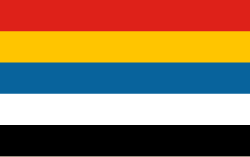| Republic of China at the 1924 Summer Olympics | |
|---|---|
 | |
| IOC code | ROC (Chine used at these Games) |
| NOC | Chinese Olympic Committee[a] |
| in Paris | |
| Competitors | 4 in 1 sport |
| Medals |
|
| Summer Olympics appearances (overview) | |
| Other related appearances | |
China, as the Republic of China, attended the Summer Olympic Games for the first time at the 1924 Summer Olympics in Paris, France. Far Eastern Games Chinese Competition Committee sent 4 tennis players, Khoo Hooi-Hye, Ng Sze-Kwang, Wei Wing-Lock, and Wu Sze-Cheung to sign up for the tennis competition, with Wei Wing-Lock being the team's captain. The delegation even attended the opening ceremony, but later withdrew from the tennis competition. Nevertheless, this is the first appearance of Chinese people at an Olympic venue.[1][2][3]
The following players:
attended the opening ceremony and signed up for men's singles and men's doubles tennis, but all withdrew from the competition after the opening ceremony, recorded as forfait général.[4][5]
萬國運動會本屆定本年七月十三日至二十四日止,在法京巴黎舉行,各國將遣送選手出席與賽,我國方面,昨據葛雷博士語人云,萬國運動,我國應即加入,惟以經費支絀,恐不能遣送全部選手前往,現擬先派網球選手數人赴法,將來如經費充裕,或將繼續遣送,至網球選手出發之期,當在一月之後,前參預六屆遠東運動會之吳仕光昆仲及魏君等可望在選派之列云。
遠東運動會中國競賽委員會,已派廣東韋榮洛君為中國網球隊隊長,參與本屆在法國巴黎舉行之第八屆萬國運動會,及美國之台費司杯奪標比賽,台費司杯比賽,亦系公開,無論何國人皆得加入,韋君曾於去年加入第六次遠東運動大會網球比賽,此番受遠東運動會中國競賽委員會之正式委派,有全權挑選隊員,代表我國參與歐美兩大國際網球競賽,韋君已定於四月一日赴洋,先至美國,與海外網球界有所接洽,並準備參與比賽事,我國運動方面加入世界比賽者,此為第一次。
39 seulement s'alignérent, ne représentant plus que 24 nations, la Chine, le Portugal et la Yougoslavie ayant déclaré forfait.
{{cite book}}: |author= has generic name (help)